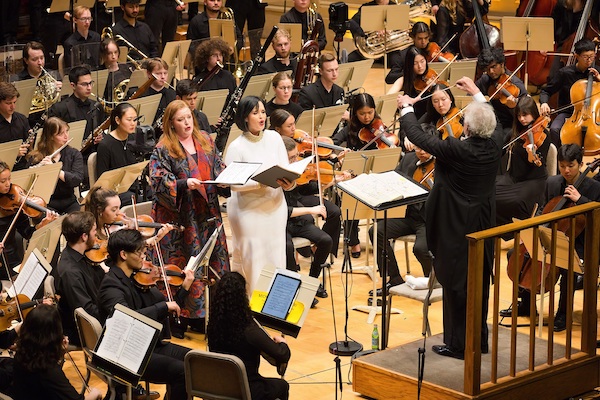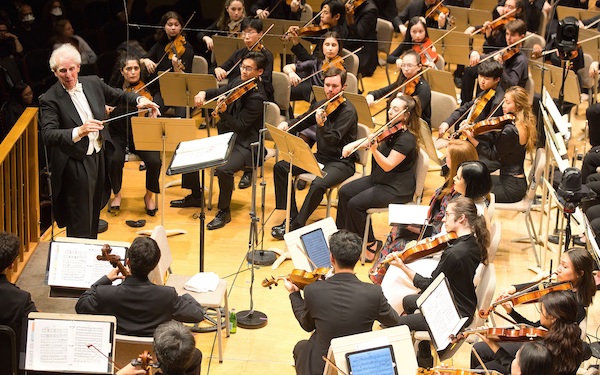Classical CD and Livestream Reviews: Mahler 2, Two Ways
By Jonathan Blumhofer
In both performances, tempos are fleet but not rushed. The big moments — from the hellish apex of the first movement’s development to the screaming climax of the Scherzo and the cathartic resolution of the finale — pack heavy punches.
 Semyon Bychkov’s ongoing cycle of Mahler symphonies with the Czech Philharmonic Orchestra has been, so far, commendable if not entirely overwhelming. But it really seems to have stepped into its own with this new account of the Symphony No. 2 (“Resurrection”) that also features soprano Christiane Karg, mezzo-soprano Elisabeth Kulman, and the Prague Philharmonic Choir.
Semyon Bychkov’s ongoing cycle of Mahler symphonies with the Czech Philharmonic Orchestra has been, so far, commendable if not entirely overwhelming. But it really seems to have stepped into its own with this new account of the Symphony No. 2 (“Resurrection”) that also features soprano Christiane Karg, mezzo-soprano Elisabeth Kulman, and the Prague Philharmonic Choir.
Theirs is a performance that’s at once fresh, lively, full of character, and consistently well directed. In the big outer movements, Bychkov paces nearly everything rightly: the tread of the first movement’s march rhythms are tightly focused, while its lyrical turns are warm and tender as can be. In his hands, too, the Andante functions like the ländler it’s supposed to be.
Flowing, melismatic lines, spitting grace notes, and a terrific sense of sweeping power mark the Scherzo, whose compositional brilliance emerges lucidly. After this, Kulman’s delivery of the “Ulricht” is pure and resonant.
Bychkov and his forces manage a gripping display of bold tonal contrasts and intensity through the big finale. In fact, there’s something of Georg Solti in the conductor’s tempos and balances: the noble chorale sings with burnished, Chicago-worthy blend and the “Resurrection” march snaps.
But expressively, Bychkov mines more out of the music than his predecessor did. To be sure, the Philharmonic’s command of the notes is masterful. The choral contributions are, likewise, warm, fluent, and beautifully blended. Aside from a surprisingly anemic organ entrance at the climax, here is a thoroughly rousing Mahler Second from a conductor one doesn’t always associate with this composer.

Benjamin Zander conducting the Boston Philharmonic Youth Orchestra in a performance of Mahler’s Symphony No. 2 at Symphony Hall. Photo: Hilary Scott
Closer to home — and with a conductor and orchestra known for diving head-first into this challenging fare — the Boston Philharmonic Youth Orchestra and Benjamin Zander recently wrapped their 11th season with this same work.
Before the pandemic, the pairing made a couple of critically acclaimed Mahler recordings (one of the Sixth Symphony and one of the Ninth). One wouldn’t mind seeing this year’s Second (as well as last year’s Fourth) joining that discography. As things stand, the stream of last Wednesday’s season finale — in hi-definition video and good sound — is the next best thing.
There’s always been much to admire in the BPYO’s playing over the years: the name belies the fact that, as an ensemble, they operate at a professional level. And this Mahler, though it will surely grow in security and polish when it’s repeated next month on the orchestra’s tour of South Africa, doesn’t disappoint.
Much of what’s written about the above recording applies here, too. Tempos are fleet but not rushed. The big moments — from the hellish apex of the first movement’s development to the screaming climax of the Scherzo and the cathartic resolution of the finale — pack heavy punches.
But the performance isn’t all about sound and fury. The Allegro moderato’s second subject floats with introspective tenderness. The second movement unfolds with rare flexibility and grace; its final cadence falls with stunning precision. And the fourth, luminously sung by mezzo-soprano Jennifer Johnson Cano (who seems to be channeling Lorraine Hunt Lieberson for fervency and projection in this piece), is the picture of devotion.

Benjamin Zander conducting the he Boston Philharmonic Youth Orchestra in a performance of Mahler’s Symphony No. 2 at Symphony Hall. Photo: Hilary Scott
In the structurally unwieldy finale, everything somehow falls into place. Soprano Maria Brea, making her Boston debut, soars; Chorus Pro Musica sings with resplendent color and dynamic control; and organist Jack Earnhart all but blasts the roof off Symphony Hall.
Tying the whole production together is Zander’s interpretation. The conductor has long had a special affinity for Mahler and that’s been coming through with a vengeance since the BPYO and Boston Philharmonic returned from their pandemic hiatuses in 2021. (Fittingly, he’s receiving the Mahler Society of New York’s first Titan Award for his lifelong advocacy in July.)
The present Mahler is of a piece with his earlier readings, especially those from the last 18 months: deeply felt, rightly judged in terms of tempos and balances, and, as a result, emerging with utter naturalness. That’s an exceedingly rare phenomenon — unless, of course, you’re Zander, who, with Michael Tilson Thomas and Simon Rattle, is among the top tier of living Mahler interpreters.
That he can prove so much with a youth orchestra is astonishing. Don’t let their name — or Zander’s familiarity as a local fixture — fool you. This is special. Take note, give thanks, and appreciate it for the gift that it is.
Jonathan Blumhofer is a composer and violist who has been active in the greater Boston area since 2004. His music has received numerous awards and been performed by various ensembles, including the American Composers Orchestra, Kiev Philharmonic, Camerata Chicago, Xanthos Ensemble, and Juventas New Music Group. Since receiving his doctorate from Boston University in 2010, Jon has taught at Clark University, Worcester Polytechnic Institute, and online for the University of Phoenix, in addition to writing music criticism for the Worcester Telegram & Gazette.

Wonderful double-review! I sang in a performance of Mahler 2 under Bernstein at Tanglewood–one of the most memorable occasions of my life! (I was so excited that I lost my voice at the climax–felt deeply ashamed at the time.) Thanks, Jonathan, for helping us “hear” these two readings of one of the great masterpieces of the repertory. I hope the stream of the Zander/BPYOis still available–I’d love to hear it. (I just tried it, and could see the video but not hear anything….)
Wow, I see–I forgot to hit the Unmute button. Suddenly these gorgeous sounds–yes, professional-level, all right!–came soaring out of my computer’s loudspeaker. I recommend it highly, and I want to hear the Bychkov recording now as well. Thanks for sharing these experiences, Jonathan!